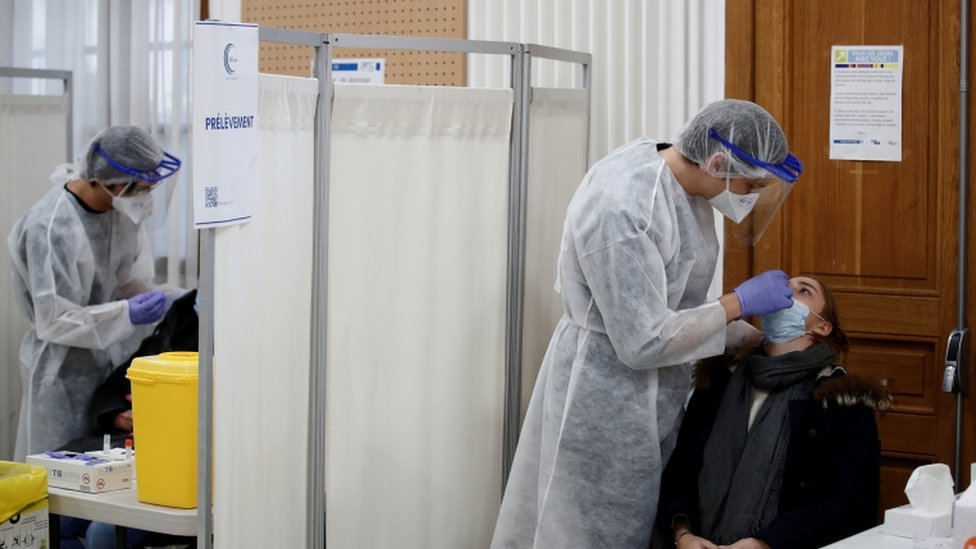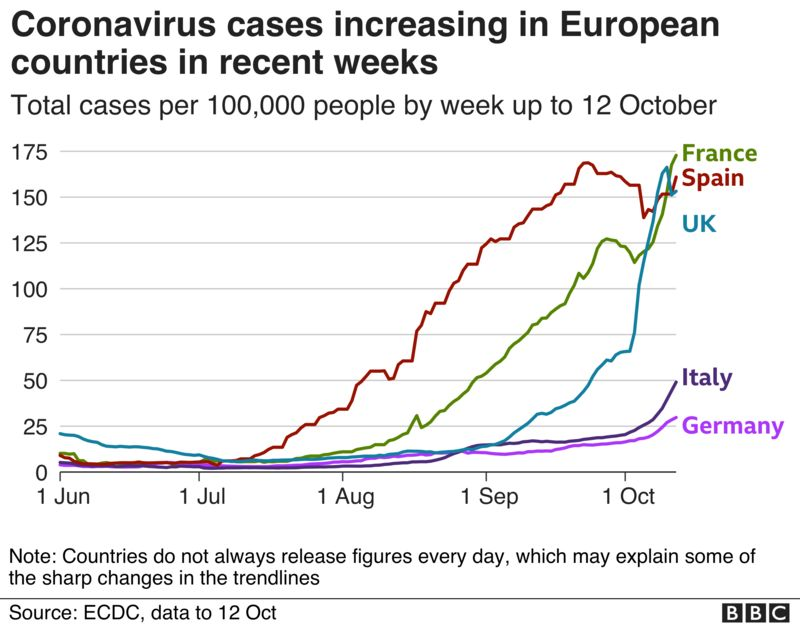Coronavirus: France to impose night-time curfew to battle second wave
French President Emmanuel Macron has announced a night-time curfew in Paris and eight other cities to try to curb the rapid spread of coronavirus.
The measure – from 21:00 to 06:00 – will come into effect from Saturday and last for at least four weeks, Mr Macron said in a televised interview.
A public health emergency has also been declared.
Meanwhile Germany announced that bars and restaurants in higher-risk areas must close early.
Chancellor Angela Merkel announced the tightened restrictions on Wednesday as the country recorded more than 5,000 new infections for the first time since April.
On Thursday, that number rose again, with 6,638 cases recorded – the highest daily figure since the start of the pandemic.
Under the new rules, areas where infections exceed 50 per 100,000 inhabitants, bars and restaurants must close their doors by 23:00. Private gatherings will be limited to 10 people from two households.
Across Europe, governments are introducing new restrictions to battle a second wave of infections.
A partial lockdown has come into force in the Netherlands and cafes and restaurants are closing.
Earlier, Spain’s north-eastern region of Catalonia said bars and restaurants would close for 15 days from Thursday.
The Czech Republic has shut schools and bars. It has the highest rate of infection in Europe over the past two weeks, at 581.3 cases per 100,000 people.
The Irish government announced a ban on household visits from Thursday night, but childcare and visits on compassionate grounds will still be allowed.
What are the new measures in France?
The night-time curfew will apply to the capital Paris and its suburbs as well as Marseille, Lyon, Lille, Saint-Etienne, Rouen, Toulouse, Grenoble and Montpellier.
Affecting around 22 million people, it will be applied for four weeks to begin with and Mr Macron’s government will seek to extend it to six.

The measures will stop people visiting restaurants and private homes during the evening and night-time, Mr Macron explained.
Residents will need a valid reason to be outside their homes during the hours of curfew, the president said, adding that he understood that a curfew was a “hard” thing to ask people to do.
Essential trips will be permitted. Anyone found breaking the curfew will be fined €135 (£121).
Schools will remain open and people will still be able to travel between regions during the day.
Additionally, no more than six people will be allowed to gather inside private homes, but exemptions will be made for large households, Mr Macron explained.
Businesses that suffer financially due to the new measures will be eligible for state aid, he said, adding that a second nationwide lockdown would be “disproportionate”.
“The message I want to send this evening is that I need each of you, we need each other, to find solutions,” the president said. “We will get through this, together.”

A long winter ahead

“We’re in the second wave,” the president said. For many people his address will have sounded distressingly similar to what he had to say at the start of wave one. Situation dire; hospitals under threat; public failing to get it; action.
Of course there are huge differences. Today we know so much more. We wear masks and get tested. Doctors have better treatments. And another national lockdown – like the one in March – has been ruled out.
But suddenly it feels like we are back where we began. Just as in March, we are warned of a virus that has become rampant and can only be stopped with drastic action. Just as in March, we’re told the health system risks being swamped.
People will accept the curfew. What choice do they have? But it feels like the start of a long, miserable winter.

How bad is the situation in France?
A further 22,951 cases of Covid-19 were confirmed on Wednesday. “We have to act. We need to put a brake on the spread of the virus,” Mr Macron said.
Now was not the time for “conviviality”, he explained, saying that the virus is spreading at parties and “festive evenings”.
The president added that this wave of Covid-19 was different to the outbreak in the spring because the virus had spread to all parts of France.
The country managed to control the first outbreak by introducing a national lockdown.
It then opened bars and restaurants in the summer and allowed foreign tourists to visit as part of an effort to boost the ailing economy. Schools reopened and universities began teaching in person classes in early autumn.
But since August the number of reported cases has been rising and has accelerated quickly in recent weeks.
Wednesday was the third time in six days that France reported more than 20,000 new infections. Mr Macron said the new measures aimed to reduce daily cases to around 3,000.
As with the first wave of Covid-19, there is concern that hospitals and intensive care units will become overwhelmed with patients.
On Wednesday the number of people admitted to hospital in France with Covid-19 rose above 9,100 for the first time since the end of June.
Furthermore, the country became the ninth in the world to surpass 33,000 deaths from the disease.


What’s happening elsewhere in Europe?
- Catalonia also said restaurants in the region of about 7.5 million people would only be allowed to serve takeaway. Gyms and cultural venues will be allowed to operate at 50% capacity, while shops and large shopping centres must be limited to 30% capacity.
- On Wednesday Italy recorded its highest daily rise in infections since mass testing began with 7,332 new cases confirmed.
- In Portugal, the government said gatherings would be limited to five people from Thursday. Weddings and baptisms can be attended by up to 50 people but university parties will be banned.
- A three-week partial lockdown began late on Tuesday in the Czech Republic, with schools, university halls, bars and clubs all shut. There have been 1,106 deaths from Covid-19 since 1 March, and more than 8,000 new cases were announced on Wednesday, for only the second time since the pandemic began.
- Poland has reported 116 deaths in the past 24 hours – its highest number since the start of the pandemic – and a record 6,526 new cases.
- Belgian officials have warned that if current rates of infection continue, all the country’s 2,000 intensive care beds could be filled by mid-November.



